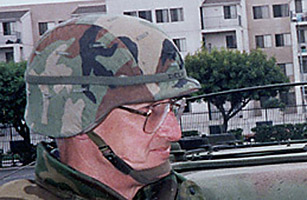
Describe what you saw as you and your troops pulled up to the scene?
There were a lot of things going on at once. There was a lot of smoke and fires going off all over the darned place. A lot of electricity was off. Portions of the city was absolutely dark other than the flickering of fires. We couldn't tell who was a gangbabnger, who was a looter or who was just a scared resident.
So they couldn't immediately recognize who was dangerous. How did that affect the soldiers?
Our veterans were having flashbacks to Vietnam in their shared experiences in not knowing how to recognize the enemy, which is a problem they are having overseas right now.
How long was it before you got control? What did you observe when that happened?
It took a day and a half to really get a handle on things. A lot of good people got caught up in their emotions, and were invovled in looting. Later on they were very remorseful. A lot of our soldiers ran into people that said 'I've stolen a TV, what do I do now.'
Logistically how did you set yourself up to quell the rioting?
We had to widescatter the troops. It was a risk we were taking. We put guys out two-by-two, but because of the geographical area, we had to rely on young non commissioned officers. It was much like our Watts, 1965 experiences. We'd get sniped at, sometimes people would even respond to us with machine guns.
Did you have to fire on anyone?
Fire discipline was extremely important in the forefront of our minds. Each soldier was given 30 rounds. Actually two people were hit by gunfire. Both felons. One was a drug dealer who was trying to run down our soldiers. Another was a guy on probation for vehicular manslughter from Florida.
In your view, was it a majority of people going for broke, or was the mayhem centered around a select few?
Well, it eneded up spreading to many areas. It all started at Florence and Normandie. But it scattered into Compton and other areas. Television helicopters flying over had an incredible impact. The looting was not being stopped (by police), and it became come one come all.
Many have said what happened was not actually a race riot, but rather an explosion of anger. Would you agree?
Race had nothing to do with it. Blacks, Hispanics, whites, all doing it. It was based on background. The problems had bubbling for a long time, the area was rife for riots. After Soon Ja Du got off on probation (for the shooting of Latasha Harlins), as a consequence Koreatown made itself an armed camp and took law enforcmement into their own hands.
What about the political establishment and the police? Did they help or hinder the situation?
(Mayor) Tom Bradley made a terrible mistake. Just as things were starting to rumble, he made a comment about "renegade cops" and that the court's decision was not what was expected. Bradley made it worse with his comments. He made it clear that heads were going to roll. One of my soldiers who was a security guard, taped the mayor talking outside of the store where he worked. Soon after, all hell broke loose. Everything was complicated by the fact that the mayor didn't get along with the police chief.
So who did you go to?
We had a good friend in the (L.A. County) Sheriff's department...he was the undersheriff at the time. He was someone the National Guard had worked with before, and we trusted him.
At what point was it finally safe to walk the street?
It took about three days to restore order, but people didn't want us to go home. They told us it was the first time in years they felt safe just going to the market. We had soldiers out on every corner and people couldn't have been nicer to us. We even stopped worrying about our solders getting fed. I couldn't have been prouder of our soldiers.
So what are you up to now?
Well I took mandatory retirement later in 1992 and after that I spent five years traveling all over talking about the riot, even in the Soviet Bloc, and also with U.S. military command groups talking ethics. But I'm retired now from all that.
You've lived through two Los Angeles riots, could there be another?
(Baseball commissioner) Peter Ueberroth got put in charge of a group called Rebuld L.A., but it never got rebuilt. There was some redevelopment, but some employers never went back. The economic issues there never got solved. With the right kind of triggers, you could have the same thing happen again.